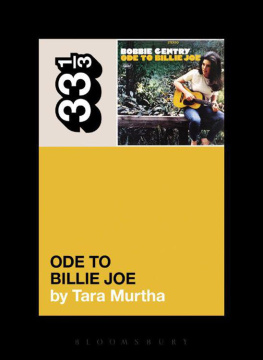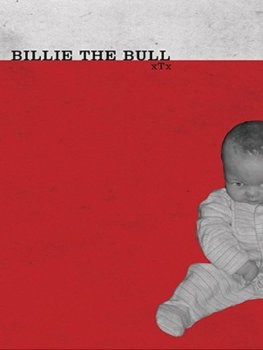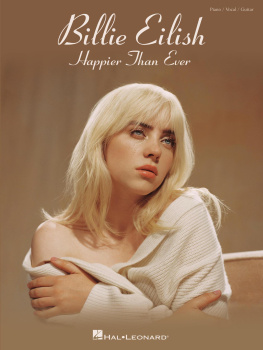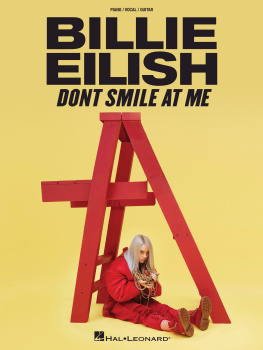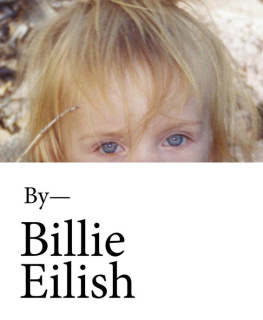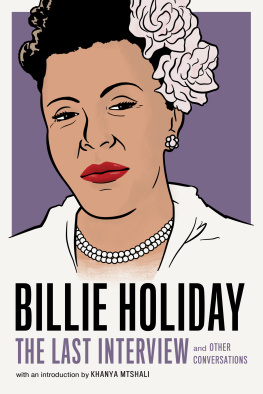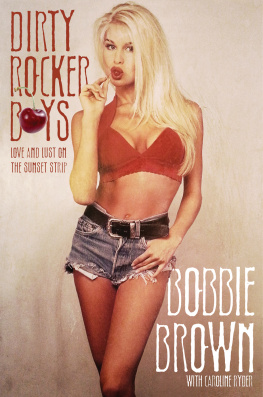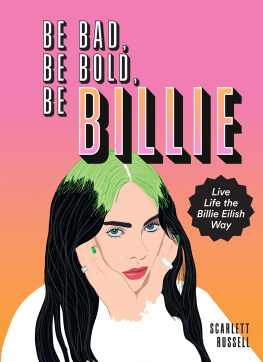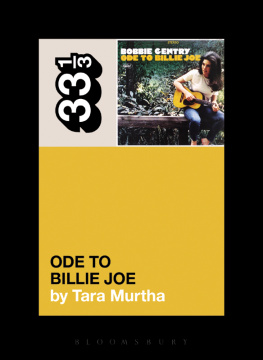
ODE TO BILLIE JOE
Praise for the series:
It was only a matter of time before a clever publisher realized that there is an audience for whom Exile on Main Street or Electric Ladyland are as significant and worthy of study as The Catcher in the Rye or Middlemarch The series is freewheeling and eclectic, ranging from minute rock-geek analysis to idiosyncratic personal celebration The New York Times Book Review
Ideal for the rock geek who thinks liner notes just arent enough Rolling Stone
One of the coolest publishing imprints on the planet Bookslut
These are for the insane collectors out there who appreciate fantastic design, well-executed thinking, and things that make your house look cool. Each volume in this series takes a seminal album and breaks it down in startling minutiae. We love these. We are huge nerds Vice
A brilliant series each one a work of real love NME (UK)
Passionate, obsessive, and smart Nylon
Religious tracts for the rock n roll faithful Boldtype
[A] consistently excellent series Uncut (UK)
We arent naive enough to think that were your only source for reading about music (but if we had our way watch out). For those of you who really like to know everything there is to know about an album, youd do well to check out Continuums 33 1/3 series of books Pitchfork
For reviews of individual titles in the series, please visit our blog at 333sound.com and our website at http://www.bloomsbury.com/musicandsoundstudies
Follow us on Twitter:
Like us on Facebook: https://www.facebook.com/33.3books
For a complete list of books in this series, see the back of this book
Forthcoming in the series:
Live Through This by Anwyn Crawford
Fresh Fruit for Rotting Vegetables by Mike Foley
Freedom of Choice by Evie Nagy
Super Mario Bros. by Andrew Schartmann
and many more
Ode to Billie Joe

Tara Murtha
Bloomsbury Academic
An imprint of Bloomsbury Publishing Inc

Track Listing
Side 1
| Mississippi Delta (3:05) |
| I Saw an Angel Die (2:56) |
| Chickasaw County Child (2:45) |
| Sunday Best (2:50) |
| Niki Hoeky (2:45) |
Side 2
| Papa, Woncha Let Me Go to Town With You (2:30) |
| Bugs (2:05) |
| Hurry, Tuesday Child (4:52) |
| Lazy Willie (2:36) |
| Ode to Billie Joe (4:15) |
Contents
Love to Jesse Lundy, for turning me on to the record and everything else, and mom and dad for the love and support. High fives to Bryan Holley and Jill Sobule for the trust and friendship. Heartfelt thank you to everyone who shared their memories or expertise, especially Jimmie Haskell, Ken Mansfield, Judith Paris, Sondra Currie, Max Baer, Jr., Don Bradburn, David Axelrod, Roger Douglas, Don Zimmerman, Herman Raucher, Francis Llacuna, Mike Deasy, L-P Anderson, Robin Mathis, Dick Boak, Neil Rushton, Brandy Herbert, Karl Ivanson, Bobby Craig, Frank Kejmarand everyone else who passed my message along or talked to me off the record.
And, of course, to Bobbie Gentry for the art and the adventure.
Ode to Billy Joe, by Bobbie Gentry
It was the third of June, another sleepy, dusty, delta day,
I was out choppin cotton and my brother was bailin hay;
And at dinner time we stopped and walked back to the house to eat,
And Mama hollered at the back door, Yall remember to wipe your feet.
Then she said, I got some news this mornin from Choctaw Ridge,
Today Billy Joe McAllister jumped off the Tallahatchee Bridge.
Papa said to Mama, as he passed around the black-eyed peas,
Well, Billy Joe never had a lick o sense, pass the biscuits, please,
Theres five more acres in the lower forty Ive got to plow,
And Mama said it was a shame about Billy Joe anyhow.
Seems like nothin ever comes to no good up on Choctaw Ridge,
And now Billy Joe McAllisters jumped off the Tallahatchee Bridge.
Brother said he recollected when he and Tom and Billy Joe,
Put a frog down my back at the Carroll County picture show,
And wasnt I talkin to him after church last Sunday night,
Ill have another piece of apple pie, you know, it dont seem right.
I saw him at the sawmill yesterday on Choctaw Ridge,
And now you tell me Billy Joes jumped off the Tallahatchee Bridge.
Mama said to me, Child whats happened to your appetite?
I been cookin all mornin and you havent touched a single bite,
That nice young preacher Brother Taylor dropped by today,
Said hed be pleased to have dinner on Sunday, Oh, by the way,
He said he saw a girl that looked a lot like you up on Choctaw Ridge
And she an Billy Joe was throwin somethin off the Tallahatchee Bridge.
A year has come and gone since we heard the news bout Billy Joe,
Brother married Becky Thompson, they bought a store in Tupelo,
There was a virus goin round, Papa caught it and he died last spring,
And now Mama doesnt seem to want to do much of anything.
And me I spend a lot of time pickin flowers up on Choctaw Ridge,
And drop them into the muddy water off the Tallahatchee Bridge.
Lyrics printed with permission of Northridge Music

Bobbie Gentry donated this early draft of Ode to Billie Joe to the University of Mississippi, where it is held in Special Collections alongside works by William Faulkner and Tennessee Williams
September 10, 1967: Like every Sunday night, I beg my parents to let me stay up late past my 9 p.m. curfew to watch The Smothers Brothers Comedy Hour. I love that show. My favorite part is the musical guest. Sure they sometimes have squares like Jim Nabors, who always disappoints by not singing like Gomer Pyle, but they also book the bands too cool for American Bandstand.
I read in the TV Guide (always well-prepped) that tonights guest is Bobbie Gentry. I am not that excited as shes supposed to be country & western. I dont believe I like country & western. I am more psychedelic rock. Well, little did I know that I was about to experience my own weird, child-sized psychedelic trip.
Tommy Smothers introduces Bobbie. Then we hear a lone guitar, followed by an almost sickly-sounding fall from the string section. And there is Bobbie, green sleeveless mini-dress, full-on Priscilla Presley hairdo, playing her parlor-sized guitar. I havent seen many women-guitarists, so right away I am all in. Behind Gentry, three expressionless white mannequins sit at an old dining table under a Victorian stained-glass hanging lamp.
Its completely creepy.
Bobbies delivery is, of course, soulful but also incredibly matter-of-fact. In that era, singers, especially female singers, usually smiled, even when performing a terribly depressing number. But this Bobbie doesnt let up. The desolate mood is unbroken. At the end of the song, she pays us no attention, puts down the guitar, and walks back to the dining table to sit in the empty chair.
Next page
